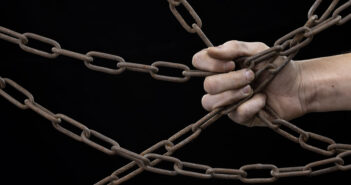Everything appeared awesome on the outside.
The Gay Narcissist was all smiles and reassuring words in the early days of the Gay Narcissistic Relationship.
“I love you” was said quickly and often.
I ate it up every single time I heard those words. It provided me with the continuous reassurance that my longtime search for the perfect partner was over… and that I was worth anything.
On top of that, the Gay Narcissist and I did the typical early relationship stuff. We’d go places, see stuff, spend money on crap (well, I’d spend money on crap for us). Wasn’t that what newly minted couples did? Weren’t they active in the world, showing off their love through fun and adventure?
Something, though… something wasn’t quite right.
Despite my desperation to finally proclaim I had a boyfriend and I was lovable, I could sense the goings on were an external facade. Because, quietly, during all of the supposedly fun and adventure, the Gay Narcissist was always watching me and observing. He asked me a lot—and I mean a lot—what was wrong, even though nothing was, in fact, wrong.
But by asking me if something was on my mind, it planted the seed of an idea in my mind. Maybe something was wrong, something I should be mindful of and work on correcting. I don’t know if that was his intention, but it sure was the result.
Always On Edge
Meanwhile, the Gay Narcissist himself was always simmering just under the surface.
Forget the fragile happy-go-lucky persona he showed the world. He was always on edge, and rarely ever easy-going and happy. To describe the Gay Narcissist accurately would be to say he was agitated, anxious, frustrated, and annoyed; it took very little nudging to bring that stuff out.
He had a bad day at work? He unloaded his bad day at work on me.
His commute was shitty? He unloaded his shitty commute on me.
His family and friends were making demands of him? He unloaded those demands on me.
I know, I know.
Boo-hoo, Steven, boo-hoo.
If the Gay Narcissist was such an obnoxious and unpleasant jerk-off so early in the game, why did I stick around? Why didn’t I cut and run?
It’s complicated.
Jumping Hosts
It’s complicated because I was convinced of two realities at the same time.
The first reality: I could fix all of the Gay Narcissist’s problems.
The second reality: I was also the root of his problems (even at the beginning, I guess) and so if I could fix myself, all would be well.
The life of the Gay Narcissist with his ex before me—a guy I’ll call “the Prior Ex”—eerily mirrored my own fate with him, and when that relationship finally died and the Gay Narcissist prepared to jump hosts to me, I made myself completely available to him. Latch on, please!
And just like with me, the Gay Narcissist lived with the Prior Ex for a few months before finally moving out. He had nothing to fear, though. I was ready to be there for him. Long drives with the Gay Narcissist were on the docket as we moved his stuff from the old house into a new apartment much closer to work.
But I loved the drives. It was quality time in a sense, and I had the Gay Narcissist all to myself on the road.
Reflecting on it now, however—it was way too much way too soon.
The Gay Narcissist should have already established his new life, free and clear of any past baggage. But he didn’t, and as was his way, he parasitically jumped from the Prior Ex to me. He needed another person to keep him mentally afloat.
Talk about an early warning.
The Gay Narcissist was a complicated bundle of emotions. It was understandable somewhat. One chapter of his life was ending, and another was beginning. But during those many moments the two of us were alone, he would unload all the burdens of the world on me.
He acted as though he and he alone carried the weight of the world on his shoulders.
In The Shallow Depths
He didn’t show that same concern for me.
Getting back to the external visuals versus the internal realities, we had plenty of pictures online showings us posing on hikes, smiling at impromptu lunches in quaint little towns, and stopping at historic tourist traps.
It all looked great, budding love and all that.
All of that agitation and sullenness never showed up for the camera. Fear not, though—it was there, always, lurking in the shallow depths.
What was really frustrating and upsetting about the Gay Narcissist’s interior landscape was its extreme binary. He was both a worldweary victim and a rage-filled accuser.
An example: if I was busy at work and couldn’t meet for one of our lunch dates (which turned from fun to demanding very quickly), I was met with accusations of why.
Or, consider this strange incident.
As one of our initial weekends wound down, we watched television one night at the home he shared with the Prior Ex. I was tired and dozing. It’s my way. I’m a sleepy and lazy guy.
The Gay Narcissist didn’t like this one bit.
I forced my eyes open at one point. And as I tried to shake the fatigue off, the Gay Narcissist was staring at me. He did his signature lip flare at me. It meant he was truly annoyed.
You better not expect me to go to bed already, he said to me. If you think I’m going to just stop for the night because you’re tired, I’m not. He proceeded to accuse me of trying to control his sleep schedule… because I was tired and dozing.
Wow, noted.
But despite this, I kept pining away for and going back to the Gay Narcissist.
Amazing Though Overwhelming
One book I reference a lot in my essays and articles covering narcissistic relationships and toxic romance is Psychopath Free: Recovering From Emotionally Abusive Relationships With Narcissists, Sociopaths, And Other Toxic People.
If you’ve not picked this book up, it’s one of the best out there. Its author, Jackson MacKenzie, was a target of narcissistic abuse in the past, and his writing is so relatable its uncanny.
Please buy the book using this affiliate link if you’d like to support my work in a small way.
MacKenzie describes the early phases of indoctrination into an abusive relationship with a toxic person. (He refers to such individuals as “psychopaths,” but for our purposes, it’s easily interchangeable with “narcissist.” They’re all disturbed characters in the end, anyway.)
Idealization is the first stop on this ride, and it feels awesome.
You’re it, the one, the soulmate, all of that crap. You can do no wrong, every word you speak is poetry, and your every thought is genius. It’s suspicious behavior when observing from afar. But when you’re in it, the feeling is often amazing (though overwhelming).
Here’s where it gets interesting.
In Psychopath Free, Jackson MacKenzie writes about the subtle shift from out-and-out idealization to where you’re now being “indirectly persuaded” to the side of the narcissist. Comments are made about how you’re nothing like the “crazy ex.” You’re a better and more understanding person.
But as MacKenzie writes:
These are not compliments. They are expectations.
The psychopath has come up with a checklist of human traits and emotions that bother them, and now they’re planting the idea in your mind: don’t express these things, or else. Now, when you fight, you will try to end it as quickly and pleasantly as possible so you’re not like their ex.
When you haven’t heard from them in three days, you won’t call because you don’t want to be like their ex. When they’re sitting on their rear end, unemployed for six months, you won’t say anything because you don’t want to be like their ex.
Any deviation from this plan, and you will receive the silent treatment or a sharp comment about your changed behavior—a reminder that the idealization could end at any time.
This kind of behavior always marks the end of idealization and the beginning of devaluation.
Why?
Because you’re now just a normal and imperfect person.
Stuck
Remember those long car rides where I helped the Gay Narcissist move into his apartment?
Well—surprise, surprise—I can’t say the same for the Gay Narcissist when he was helping me move… in with him.
Keep in mind that the Gay Narcissist pressured me to get rid of my apartment in the City to move in with him. He made it clear that if I didn’t do so my love for him and my commitment to the relationship was questionable. What a far cry from the compassionate ear I offered him when the roles were reversed.
When I finally agreed and I started packing up my apartment, there was plenty of fights and arguments. He did not like my dissenting opinions at all, even though it was my life in question. He was even annoyed I was taking time to label boxes with their contents.
But the eve before the final move—that really did put a lump in my throat.
As the Gay Narcissist and I sat on my mattress that last night in my boxed-up apartment, he started giving me that same uncomfortable stare. He then summoned up every questionable action from my past that I confided in him.
He questioned if I was truly the one meant for him. He started having doubts as he weighted all of the past decisions I made that he didn’t approve of.
I was shocked and scared by what he was doing. But all I did was sit quietly and take my verbal beating.
What was I going to do?
As the Gay Narcissist sat there lecturing and judging me, I glanced around at the packed apartment. It was all ready to go for the coming morning.
I was stuck.
* * *
Please like and subscribe to me on YouTube! There you will find an ever-growing body of video essays on narcissism and toxic relationships — all written, narrated, and produced by yours truly.





